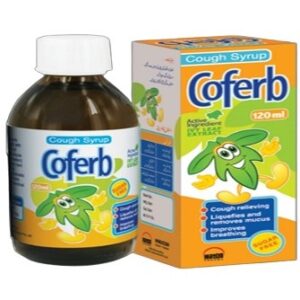Coferb syrup belongs to the group of “antitussive” medicines. These are the medicines used for the treatment of cough and congestion caused by the common cold, bronchitis, and other breathing problems. Coferb syrup contains ivy leaf extract which is a natural herb used for the treatment of cough and congestion for decades.
Do you know coferb belongs to the herbal extract category? Yes, coferb syrup is included in the herbal extract category because it is extracted from ivy leaf herb which is a natural remedy used for the treatment of cough and breathing problems. In this article, we will tell you how this herbal medicine works and what are other herbal ingredients used in this medicine.
Coferb syrup is a product of Hinucon Global and is available in the form of syrup, drops, and injections. It is available over the counter and can be found easily in pharmacies and medical stores.

Introduction:
Coferb syrup is used for the treatment of cough and congestion caused by a common cold. It liquefies and removes mucus which improves breathing and leaves a soothing effect on the throat. Coferb is an herbal medicine and is also included in the category of antitussive better known as a cough suppressant. It works by blocking the signals in the brain that trigger the coughing reflex and this helps to reduce the frequency and intensity of coughing. It also blocks the release of a chemical that causes inflammation and congestion.
Composition:
Coferb syrup contains ivy leaf extract, thyme, and licorice as active ingredients. Ivy leaf is a natural herb and it is very effective against chronic inflammatory bronchial conditions. The other ingredient thyme has anti-inflammatory properties which help to reduce bronchial inflammation and helps in breathing easily while Licorice is the last ingredient of coferb syrup and is used to decrease swelling and cough.
Is coferb syrup herbal?
Yes, coferb syrup is included in the herbal extract category because it is made up of a combination of three natural herbs ivy leaf extract, thyme, and licorice.
Side effects:
The followings are some side effects of coferb syrup if you encounter these then consult your doctor asap:
- Nausea
- Vomiting
- Epigastric pain
- Dizziness
- Stomach upset
- Drowsiness
- Dry mouth
- Difficulty in breathing
- Swelling
This medication may contain some other side effects which are not listed above if you found any other side effects consult your doctor or pharmacist as soon as possible.
Also read: trimetabol syrup side effects
How to take:
Coferb syrup is available in a variety of strengths, and the recommended dosage will depend on the individual’s age and weight.
How to take Coferb syrup:
Take this syrup with the prescription of a doctor or pharmacist.
For children (below 17), 1 teaspoon of Coferb syrup 2 times a day.
For adults (above 18), 1-2 teaspoons of Coferb syrup 2-3 times a day or prescribed by the doctor.
How to take Coferb drops:
It is important to follow the instructions on the label and not exceed the recommended dosage.
The recommended dose for children (6 to 17) is 1 drop, given every 2 hours.
For adults (18 and above), the recommended dose of Coferb 20ml is 1 drop every 2 hours.
It is advised to take these drops with the recommendation of a doctor.
How to take Coferb tablets:
Take coferb tablets with the recommendation of a doctor or pharmacist.
The dose for children (11 and below) is 1 tablet of Coferb, taken 2 to 3 times a day.
For patients (12 and above), the recommended dose of Coferb Tablets is 1 tablet, taken 2 to 3 times a day.
Precautions:
The followings are some precautions of coferb syrup:
Hypersensitive or allergic reactions:
Don’t take coferb syrup if you are allergic to ivy leaf, thyme, and licorice because it may cause hypersensitive reactions so it is better to avoid taking coferb if you are allergic to any or its ingredients.
Breathing problems:
It should not be used by individuals who have a history of breathing problems. It is better to share your medical history to your doctor before taking coferb syrup if you encounter any breathing problems in past.
Asthma or Emphysema:
If you are patient of asthma and emphysema don’t take coferb syrup without consulting your doctor because it may cause serious problems.
Glaucoma or Urinary problems:
The person who have a history of glaucoma or urinary problems should also avoid using Coferb syrup. Always share your proper medical history to your doctor before taking this medication.
Interaction with other medicines:
It is important to tell a doctor or pharmacist about any other medications that are being taken, as Coferb syrup may interact with certain drugs.
Is coferb syrup good for babies?
Yes, it is safe for babies in fact it is suitable for all age groups.
FAQs:
- What are the uses of coferb syrup?
- Is coferb syrup safe for babies?
- What are the uses of coferb syrup for babies?
- What are the benefits of coferb syrup?
- What is the dose of coferb syrup for child?
- What is the dose of coferb syrup for adults?
- What is the age limit of taking coferb syrup?
- What is the price of coferb syrup in Pakistan?
- How can we use coferb drops for newborns?
- How can we use coferb drops for 3 month baby?
- How can we use coferb drops for 2 months baby?
- How can we use coferb drops for 1 month baby?
- How do you take coferb drops?
- What are the uses of coferb plus syrup?
- What are the side effects of coferb syrup?
Disclaimer!
Mediebook does not provide medical advice, treatment, or diagnoses. The information given here is for informational purposes only, and it should not be used as a replacement for the advice of a qualified doctor or pharmacist.